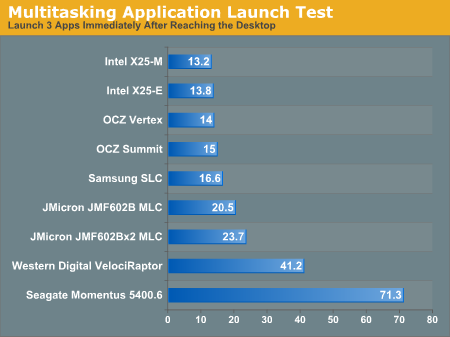The SSD Anthology: Understanding SSDs and New Drives from OCZ
by Anand Lal Shimpi on March 18, 2009 12:00 AM EST- Posted in
- Storage
The Fresh Boot Test
Allow me to set the stage. You just turn on your PC. I’m talking about a well used PC with tons of applications and data on the drive, not a clean test image. The moment you hit the Windows desktop you go and fire up the three applications you need to start working with right away.
If you ever wanted to know why SSDs are so much better, this is your reason. I ran through that exact scenario on our SSD testbeds. As soon as I hit the Vista desktop I ran Internet Explorer, Adobe Photoshop CS4 and Pinnacle Studio 12; I waited for all three to load, in the case of Pinnacle Studio I waited for my HD video project to load before stopping the timer.
The results speak for themselves:

Everyone’s beloved posterchild, the Western Digital VelociRaptor took 41.2 seconds to fully launch all three applications. Normal hard drives will fare much worse. The Seagate Momentus 5400.6, a high performance 5400RPM notebook drive took another 30 seconds on top of the WD time.
Now look at the SSDs; the worst SSDs we’ve got launch these applications in half the time of the VelociRaptor. The Intel X25-M will load the apps in about 13 seconds, barely a second longer than how long it takes to run Pinnacle Studio alone on an idle machine.
A good SSD makes Vista usable. All of the background tasks are nothing for these drives. If you ever sit there at an idle desktop and hear Vista go to town on your hard drive, those are IO operations that will bring any normal drive to its knees - or at least keep it busy enough to make all other IO requests take much longer than they should.
The SSDs that are worth recommending all deliver anywhere from 2x to 40x the number of IOs per second for small, random file writes compared to the Raptor. It doesn’t matter how many Raptors you RAID together, you’ll never achieve this sort of performance.










250 Comments
View All Comments
VaultDweller - Wednesday, March 18, 2009 - link
I love it when people critique someone's critique of grammar... and get it wrong.It's an SSD, not a SSD.
gwolfman - Wednesday, March 18, 2009 - link
lolzsidex - Wednesday, March 18, 2009 - link
I would like to know the firmware version of Vertex used in your review. To me sounds the old 0112kensiko - Wednesday, March 18, 2009 - link
Yes that is important to know.I'm sure this is not done with the latest firmware available which is 1199. This version got better performance.
Firmware 1275 is coming also.
Anand, will you update your benchmarks with the latest firmware?
If not, then the benchmarks are obsolete.
Anand Lal Shimpi - Wednesday, March 18, 2009 - link
I tested with the shipping firmware for this article (0122). I've been playing around with 1199 in the lab and will most likely have an update in a couple of weeks once I've done a thorough evaluation of it. By then I should also have the final version of the new Samsung drive and maybe even some other interesting things.For now, I've got to get to work on the new Mac Pro and the updated Ion article :) I need a small break from SSDs por favor :)
Take care,
Anand
VaultDweller - Wednesday, March 18, 2009 - link
Awww, don't you have some underlings to do your SSD-related will?Would love to see an update, and would love to see Corsair's SSD drive tested as well (it's based on Samsung's last generation MLC controller, and doesn't seem to emphasize sequential like the Summit does).
Anand Lal Shimpi - Wednesday, March 18, 2009 - link
I will do an update on the new firmware, I just want to do it right so it'll take some time :)I'll put in a request for the Corsair drive as well :)
-A
Slash3 - Wednesday, March 18, 2009 - link
Page 29: "Not all applications will launch faster than a VelociRaptor on a SSD, but let's not forget that the VelociRaptor is the world's fastest hard drive."Really? What about the nice and speedy enterprise-level 15k SAS/SCSI drives everyone neglects to acknowledge? :)
George Powell - Wednesday, March 18, 2009 - link
I believe it refers to consumer drives. While SAS drives are beginning to be a possibility on the desktop with newer motherboards supporting them natively, the drives themselves are too expensive and too noisy for most consumers to actually want them.FishTankX - Wednesday, March 18, 2009 - link
Good info. However, I noticed one mistake.Second page
Samsung had a MLC controller at the time but it was too expensive than what SuperTalent was shooting for.